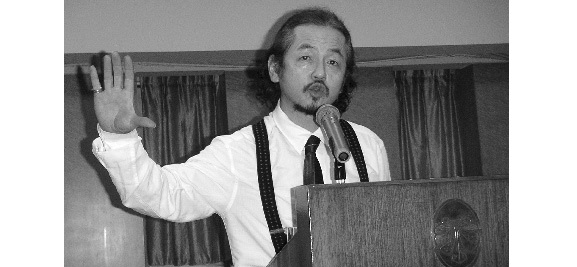How the Ikeuchi Towel Company put itself through the wringer
by Jonathan Walsh
CHANGE OR die. This was the daunting challenge faced by Ikeuchi Towel Co., Ltd in the early 1990s as depicted by the company’s Director Planning Manager Motoi Tsubouchi at the EA-Tokyo seminar on Mar. 1.
Mirroring the plight of many Japanese companies in this recent era of rapid globalization, the Shikoku-based towel manufacturer was confronted with a shrinking market at home and increased competition from abroad. The company needed tough decisions and firm management to stave off closure.
Ever since the towel industry was introduced to Japan from England some 150 years ago, the city of Imabari, the world’s largest towel manufacturing center, has been the “Towel Capital” of Japan. After President Keishi Ikeuchi’s father founded the business in 1953, Ikeuchi Towel enjoyed a wild ride of postwar industry growth that in the early 1990s encompassed some 500 companies in the region. However, halfway through that decade, the brakes started going on the industry as increasing numbers of Imabari companies began shifting their manufacturing operations to China in an effort to slash costs.
Ikeuchi began direct marketing and
opened direct sales channels to cut middlemen —
who had been taking up to 75 percent of the profit.
Since then, more than 300 firms have gone to the wall, while the remaining 160 struggle to survive. It is worth noting that during the industry’s peak period 65 percent of towels used in Japan were manufactured in Imabari. Now, 70 percent of the nation’s towels are imported; 30 percent are made domestically, and of that only 20 percent manufactured in Imabari.
And yet, Ikeuchi Towel has survived. In 1993, while his competitors were cutting costs to stay competitive, Ikeuchi embarked on a high-risk undertaking and invested ¥30 million to build one of the world’s most advanced towel factories. The company then began producing towels that met strict environmental standards, and acquired ISO certifications. Ikeuchi scrutinized every aspect of towel production to minimize environmental impact and improve quality, and switched the factory over to wind energy saving 20 percent in power costs.
In addition IT systems were introduced which slashed the manufacturing cycle from 45 days to 28, and saved on inventory costs. The company began direct marketing and opened direct sales channels to cut middlemen — who had been taking up to 75 per cent of the profit.
But perhaps most fundamentally of all, Ikeuchi Towels took a long, cold look at its product.
“White used to be the only choice of color for organic towels,” Tsubouchi says. “People have this idea that organic towels should be white and boring, but Ikeuchi thinks they should be fun, colorful and beautiful, so we now offer a range of 24 colors and make towels from organic cotton, silk, or Kamiiru (fiber made from Japanese paper).”
“We make available all the data about the chemicals used so customers can see they are safe and can feel secure that while having nice towels, they are also not harming the environment,” he says. “In addition, we ensure the dyes are the safest available. Even a child can put these towels in its mouth and it will be safe. We use numbers and data to sell what we are doing, rather than just impart fuzzy images.”
In 2001, Ikeuchi became interested in taking on the global market and began exhibiting at trade shows in the U.S. and, in particular, a large trade show called the New York Home Textiles Show in 2002.
“At the show, we thought maybe Americans might not like our towels and that our product may not be well received,” Tsubouchi recalls. “When we visited America, I thought that doing business there would be very difficult. The issues of pricing, money and receiving checks and other issues made it all seem very formidable. So we were amazed when we won the Grand Prize Best in Show among all the other products — it was like winning the lottery! This was the first time a Japanese company had ever won this award.”
The publicity paid off and within two years Ikeuchi towels were on sale in 50 specialty stores in the U.S., 20 in Paris and London, and they even had a mention in the New York Times.
Now, Ikeuchi Towel’s improving business prospects and financial results demonstrate that the future for the turnaround towel company is no doubt far brighter — and comes in more colors — than it was a decade ago, thanks in no small part to Ikeuchi’s gutsy entrepreneurial flair and environmental edge.









